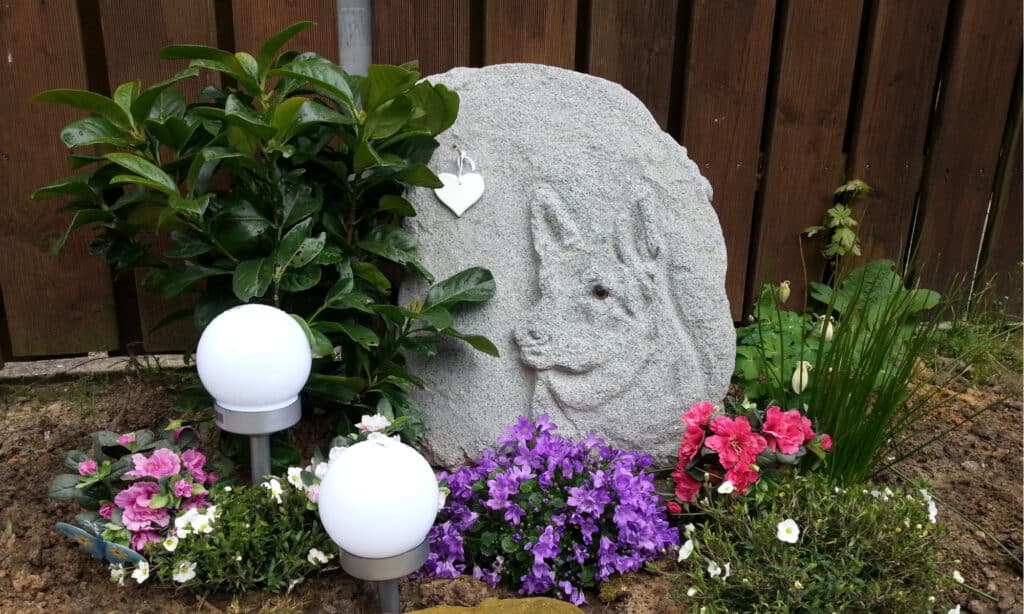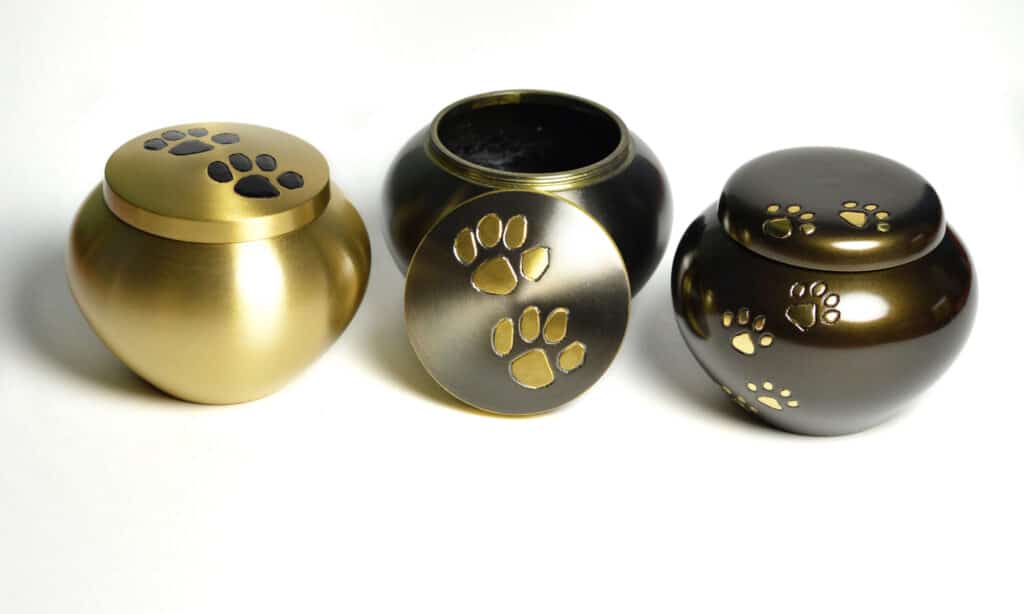Losing your beloved pet is one of the hardest parts of being a pet owner. Everyone grieves differently, which means that there is no appropriate way to deal with the death of your pet and it is important to find a healthy coping mechanism that works for you.
As pet owners, we form an intense bond with our pets and they can become valued members of the family, whether they are a dog, cat, horse, hamster, fish, or tarantula, our pets are important to us, and their death can affect us in different ways. It is completely normal to experience a range of different emotions after our pet has passed, and this article will give you some tips to cope with the loss of your pet.

A tombstone carved with an image of your pet will help you and your family commemorate their memory.
©Antimon/Shutterstock.com
Is It Difficult to Cope With the Death of a Pet?
Death is an inevitable and sad part of owning pets. Each pet owner will experience grief in a different way to the loss of their pet, usually depending on factors such as how close you were to the pet, your bond, how your pet died, and how intensely you feel emotions. It is difficult for many people to cope with the death of a pet; however, it is also normal to not feel such strong emotions that other people perhaps feel when their pet dies.
The role that your pet has in your life can also play a role in how difficult it is to cope with the death of a pet. If your pet was sick before they passed or there were certain circumstances that led you to feel helpless before they passed, then you may be feeling other emotions such as guilt and anger along with the grieving.
For example, if your pet was very sick and you were not able to afford the veterinarian funds, then you may be feeling guilty and not worthy of grieving. However, it is important to understand that everyone is entitled to grieve the death of their pet regardless of the situation, and your feelings matter.
Is It Normal to Feel Sad When Your Pet Dies?
Sadness is a common emotion people may feel when they are grieving the death of their pet, but there are a variety of other emotions that you may feel. Anger is surprisingly another emotion you may be feeling, especially if you feel your pet died too soon or that the circumstances for their death were unfair.
Not everyone will feel emotions as strongly as others, and you may even start to feel guilty if you feel that you are not grieving like others. The truth is that everyone will take their own time to grieve and will experience the situation differently.
Grieving is an individual process and experience that can present itself in different stages. The process of grief is not a straight line, and there is no order of the emotions you feel that is either right or wrong. Some people may feel like they are in denial, followed by sadness, guilt, and depression, which eventually leads to acceptance. However, this can take weeks to months and varies from person to person.
Other people may accept their pet’s death within a few days, followed by strong emotions that may come out of nowhere such as loneliness, shock, and emotional numbness. All emotions are normal and acceptable after your pet passes, even a sense of relief or contentment if your pet passed due to old age and lived a long, happy life or was euthanized and is no longer in pain.

If you have your pet cremated, you may choose to divide the cremains into “sharing urns.”
©iStock.com/Jpr03
How Long Does It Take To Grieve a Pet’s Death?
There is no set amount of time that it takes for people to grieve their pet’s death, it can take days, weeks, months, and even years before the strong emotions subside and are replaced with more tolerable feelings. The time you take to grieve your pet depends on you and the situation, and it is important to take your time when grieving as the process cannot be rushed.
For most pet owners, the death of a pet can affect you years later even if you think you fully healed. The death of a pet may always stay with you and certain things can trigger you to miss your pet regardless of how much time has passed since they died.
6 Tips for Coping With Your Pet’s Death
If you are struggling to cope with the death of your pet, these are some tips that may help you during the grieving process:
- Let Yourself Feel Your Emotions: It is not uncommon to be in denial after your pet dies, as some people take a while to process and accept that their pet is gone. This is completely normal, but you should not suppress your emotions. Crying, feeling numb, wanting to isolate yourself, or feeling a loss of motivation is common after your pet dies and many people will try to act like they are not affected when they are. It is common to feel a sense of numbness after your pet passes as your mind is still trying to process the situation, however, once your emotions do surface, it is important to accept them and understand that they are worth acknowledging.
- Try to Maintain a Normal Routine With Other Pets: If you have other pets in your care, you may struggle to care for them because of the sadness and lack of motivation you feel. If your grieving process is affecting your other pets, you should ask someone you trust to help you care for the pets until you start feeling a bit better. Other pets in the household may also grieve the loss of the pet with you, especially if it was the other pet’s companion and they regularly interacted.
- Take Time for Yourself: Although some people may prefer to distract themselves by keeping busy, you should also try to take some time to yourself. The time by yourself will help you to look after your emotional and physical health. Try not to isolate yourself from family and friends because this might make you feel lonely, especially if the pet that died kept you company. You may feel more tired and not have as much energy to keep up with your usual activities while you are grieving, so resting and focusing on your health is essential.
- Try New Healthy Coping Methods: Sometimes a good distraction is helpful in keeping our minds busy rather than focusing too much on your pet’s death. Healthy coping methods during the grieving period can include exercising to release good endorphins, eating healthy, writing down your feelings, getting plenty of sleep, and spending time with supportive family and friends.
- Create a Legacy for Your Pet: Not all pet owners want a funeral for their pet, but others may hold one in remembrance of their pet. You can also keep some of their favorite toys that they had as a reminder of your pet. You can also have portraits or pictures of your pet made so that you can have a visual to look back on to remember your pet that passed.
- Seek Help From Family, Friends, or Professionals: It can be beneficial to get help from friends or family that are able to sympathize with you and understand your emotions. They may even have gone through the same thing and know how you feel, so make sure you are talking to friends and family who do not put your emotions down and instead help understand how you are feeling and support you during your grieving process.
If you are feeling depressed and persistently unmotivated after your pet’s death, you should reach out for help from a mental health professional. They are trained to evaluate you and give you insight into how you can cope with the emotions you are feeling without judgment.
How Can You Support Someone Who Lost Their Pet?
When it comes to helping someone cope with the death of their pet, you should aim to be as understanding as possible. Keep in mind that everyone experiences grief differently, and you should not devalue their feelings by telling them that it was just an animal, and it is expected that they will die. Keep in mind most pet owners are aware that their pet will die at some point, but that does not mean everyone will be ready.
Instead, offer to help them with things that they may not be feeling like doing, such as offering to cook them a meal or spend time with them. Not everyone who is grieving will want to talk about how they are feeling right away, but when they do make sure that they understand that their feelings are valid. Offering support is the best way to help someone who lost their pet, without judging them or telling them how they should feel.
How to Help a Child Cope With the Death of a Pet
Young children may struggle to understand the death of their pets, so it is important to explain that it is a natural life experience and usually the loss of a pet is a child’s first experience with the topic of death. You can teach your children about how precious life is and how we must spend as much time with those we love. Many parents will want to shield their children from talking about a pet dying with their child, however, it is important to be open with your child about what happened so that they can get a better understanding.
Reassure your child that it is not their fault and that they should be proud of themselves for caring so deeply about animals. You do not want to replace a lost pet with another one without telling your child, for example replacing a deceased fish with one that looks similar hoping that your child won’t notice. This can create a feeling of distrust and your child may learn that they should replace a dead pet with another one without understanding the normal grieving process we can feel at any age.
Final Thoughts
Losing your pet is an unfortunate event that many pet owners are guaranteed to go through. The best reassurance we can give ourselves is that we gave the animal a loving home, and care, and impacted their life in a positive way. Regardless of the reason for your pet’s death, you will feel varying emotions that can become overwhelming and some burdensome. Grief is a natural response to losing your pet, so make sure that take time to understand your emotions and that you surround yourself with supportive friends and family.
The photo featured at the top of this post is © iStock.com/Yusuke Ide
FAQs (Frequently Asked Questions)
Can you get another pet after one dies?
Many people feel guilty about getting another pet after one dies. You may feel like you are replacing your deceased pet or you may feel scared of losing that pet too. It is normal to feel this way, and the time that it takes for you to get a new pet depends entirely on how you feel. If you feel that you are emotionally ready to take in a new pet, then that is completely up to you and not anyone else. Everyone will go through the different stages of grief differently, with some feeling better if they have a pet they can care for.
Thank you for reading! Have some feedback for us? Contact the AZ Animals editorial team.






